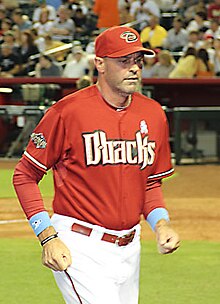Kirk Gibson
Gibson spent most of his career with the Detroit Tigers, but also played for the Los Angeles Dodgers, Kansas City Royals, and Pittsburgh Pirates.
During his career, he hit two dramatic home runs in the World Series, each one coming against an eventual Hall of Fame relief pitcher.
With the Tigers in 1984, he clinched the title in Game 5 with a three-run homer off Goose Gossage, who had refused to walk him with a base open.
With the Dodgers in 1988, Gibson faced closer Dennis Eckersley in the ninth inning of the first game and hit a pinch-hit walk-off home run—often described as one of the most exciting moments in World Series history.
He became a free agent after the 1985 season but received no significant offers because of what was later determined to be collusion among the owners of MLB teams.
He re-signed with the Tigers and in 1987, helped them to win the American League East by two games over the Blue Jays in an enthraling divisional race.
"[13] If the Padres could hold the Tigers and score a couple runs in the ninth, they would force the Series back to San Diego and maybe turn the tide.
In the Sounds of the Game video, Detroit manager Sparky Anderson was seen yelling at Gibson from the dugout, "He don't want to walk you!
In the ESPN interview that aired after the induction ceremony, Williams took responsibility for the situation, as he allowed Gossage to talk him into pitching to Gibson.
At the same time, Williams ribbed Gossage that Gibson's home run damaged several seats "in consecutive rows".
In 1988, an arbitrator ruled that baseball team owners had colluded against the players in an effort to stem free agency.
[14] Gibson joined the Dodgers in 1988, and immediately brought a winning attitude after a publicized blow-up when pitcher Jesse Orosco put shoe black in his cap during a spring training prank.
Gibson openly criticized the team, which had finished fourth in the NL West the previous season, for its unprofessionalism.
While he didn't lead the league in any major category, the intensity and leadership he brought to an increasingly successful team likely won him the award over players with more impressive statistics.
[9] (MVP runner-up Darryl Strawberry of the New York Mets, for example, led the NL with 39 home runs that season.)
In the 1988 National League Championship Series against the New York Mets, Gibson made an improbable catch in left field at a rain-soaked Shea Stadium in Game 3.
Racing back, he slipped on the wet grass and, while on his way down with his knees on the ground and the rest of his body suspended, reached out and made a full extension catch to save a potential Mookie Wilson double; however, the Dodgers lost the game 8–4.
Nonetheless, his LCS heroics served as but a prelude to the career-defining moment that awaited him in the subsequent World Series.
In Game 1, however, with the Dodgers trailing by a score of 4–3, Mike Davis on first base, and two out in the ninth inning, manager Tommy Lasorda unexpectedly inserted his hobbled league MVP as a pinch hitter.
Gibson, limping back and forth between a pulled left hamstring and a swollen right knee, made his way to the plate to face Oakland's future Hall of Fame closer Dennis Eckersley.
In 1991, Gibson signed as a free agent with the Kansas City Royals, and then in 1992 he was traded to the Pittsburgh Pirates for Neal Heaton.

